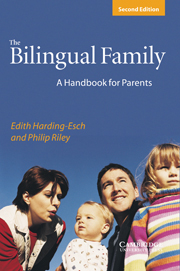Book contents
- Frontmatter
- Contents
- The authors
- Preface
- Part I A survey of the issues
- 1 Children and language
- 2 What is bilingualism?
- 3 Some things you should know about being bilingual
- 4 The development of the bilingual child
- 5 What will influence your decision whether to bring up your children as bilinguals?
- Part II Case studies: a number of bilingual families, and how they did it
- Part III An alphabetical reference guide
- Quotations
- Recommended resources
- Bibliography
- References
- Index
3 - Some things you should know about being bilingual
Published online by Cambridge University Press: 29 March 2010
- Frontmatter
- Contents
- The authors
- Preface
- Part I A survey of the issues
- 1 Children and language
- 2 What is bilingualism?
- 3 Some things you should know about being bilingual
- 4 The development of the bilingual child
- 5 What will influence your decision whether to bring up your children as bilinguals?
- Part II Case studies: a number of bilingual families, and how they did it
- Part III An alphabetical reference guide
- Quotations
- Recommended resources
- Bibliography
- References
- Index
Summary
Bilingualism is a matter of degree
Everybody knows what ‘bilingual’ means; yet, as we have seen, as soon as we start trying to define the concept precisely, things get very complicated. This is not just hair splitting; if bilingualism is complex, it is because it is directly related to complex social issues.
Most definitions run into trouble because they derive from a view of bilingualism that is idealised. The bilingual is regarded as ‘someone who speaks two languages perfectly’. For example, in the quotation from Bloomfield given above (section 2.1) we found him referring to bilingualism as ‘native-like control of two languages’. But what is ‘native-like control’? We only have to look around us to see that people vary enormously in the degree to which they can control their native language, and exactly the same is true for the non-native. At what point, then, do we decide that he is now ‘native-like’? As Bloomfield continues:
Of course, one cannot define a degree of perfection at which a good foreign speaker becomes a bilingual: the distinction is relative.
This is not a contradiction, but a realisation that bilingual people have to be placed on a continuum raelative to the notion of ‘native-like control’ of two languages. In other words, the problem is that of defining degrees of bilingualism. Bilingualism is not a black-and-white, all-or-nothing phenomenon; it is a more-or-less one. We recognise this every time we say that: ‘Fred speaks better German than Joe’.
However, just as it is hard to think of people who really have achieved total mastery of two languages in every possible domain, so it is difficult to go to the opposite extreme and say like Haugen that ‘bilingualism is understood … to begin at the point where the speaker of one language can produce complete meaningful’.
- Type
- Chapter
- Information
- The Bilingual FamilyA Handbook for Parents, pp. 33 - 49Publisher: Cambridge University PressPrint publication year: 2003



